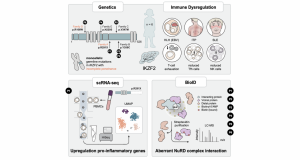The god of sun at the forefront of immunodeficiency-research
Scientists link mutations in the transcription factor Helios to a novel disease characterized by immunodeficiency and immune dysregulation.
When scientists at St. Anna Children’s Cancer Research Institute (St. Anna CCRI) identified an immune dysregulation caused by a biallelic germline mutation affecting Helios – a transcription factor frequently found altered in some hematopoietic malignancies, including leukemias – they aimed to study the effects of Helios mutations on hematopoiesis and immunity.

Together with their colleagues, first authors Tala Shahin, PhD, and Daniel Mayr identified a total of five different monoallelic mutations in six patients with immune dysregulation. All six patients presented with compromised immune systems, suffering from systemic inflammations (hemophagocytic lymphohistiocytosis, HLH), excessive bruising and bleeding (immune thrombocytopenia, ITP) or widespread tissue inflammation (systemic lupus erythematosus, SLE).
Using state-of-the-art biochemical approaches, the researchers uncovered the underlying mechanism by which Helios causes immune dysregulation in these patients. They found that, like other transcription factors, Helios also associates with many other proteins and creates a protein network essential for transcriptional regulation. Among these interacting proteins were members of the NuRD complex (nucleosome remodeling deacetylase complex), which is a group of epigenetic factors that play a critical role in transcriptional regulation. The researchers found that a common feature for all the patients analyzed in this work was the dysregulation in the ability of Helios to interact with the NuRD complex, resulting, as the authors had proposed, in an aberrant transcription of target genes.
“Our findings are crucial for our understanding of the spectrum of clinical manifestations that are associated with mutations in Helios,” explains Univ.-Prof. Dr. Kaan Boztug (MD), senior and corresponding author of the study and scientific director of St. Anna CCRI. “Furthermore, if more patients with mutations in Helios are identified, we will be able to understand in more detail what role Helios plays in immunity and homeostasis,” Kaan Boztug adds. This, in turn, could lay the groundwork for the development of targeted treatments for affected patients with Helios mutations. Furthermore, due to an increased susceptibility of immunodeficient patients to develop malignant disease, this study is an essential contribution to childhood cancer research.
Publication: https://bit.ly/33JdeM4
Shahin, Mayr et al., Blood Adv 2022
Cooperation with:
- Ludwig Boltzmann Institute for Rare and Undiagnosed Diseases (LBI-RUD)
- CeMM Research Center for Molecular Medicine of the Austrian Academy of Sciences
- Medical University of Vienna (MedUni Vienna)
- Helsinki Institute of Life Science, University of Helsinki
- Laboratory of Immunogenetics of Pediatric Autoimmune Diseases, Université de Paris